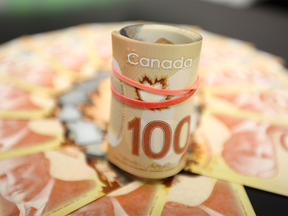A winter break on GST and a $1,000 tax rebate are among the offerings from government to taxpayers

The federal and provincial governments are offering tax rebates and breaks over the next few months.
Recommended Videos
Here is a look at what is on offer, when it’s coming and which British Columbians are eligible:
Winter GST break
This results in a five-per-cent break on grocery items, restaurant meals, children’s clothing and toys, print newspapers, Christmas trees and some alcoholic beverages.
So a family spending $2,000 on qualifying goods in B.C. would pay $100 less in GST over the two-month period.
The tax break will cost the federal government an estimated $1.6 billion. British Columbians will still have to pay the seven per cent provincial tax (PST) on those items.
Simon Fraser University economics professor Steeve Mongrain said the GST break “is more political than a sound economic initiative.”
“It will be onerous for retailers to administer it. Children’s clothing is exempt, but not sports equipment. Beer under seven per cent is exempt, but over seven per cent is not. It will stimulate sales, but for some of the durable goods on the list, it will shift consumption timing,” Mongrain said.
B.C. tax break
During the recent B.C. election campaign the NDP government promised to reduce taxes for most residents by increasing the amount of tax-free income people can claim.
The threshold for provincial tax-free income will rise $10,000 to $22,580, though the program will not apply to families earning more than $200,000 a year or individuals earning more than $125,000 a year.
“We are committed to delivering a middle-class tax cut that will benefit 90 per cent of people who file taxes in B.C.,” said a Finance Ministry spokesperson. “This will mean up to $1,000 in tax cuts for the average family every year.”
Individuals can receive up to a $500 rebate in 2025, through direct deposit or mail.
The plan still needs parliamentary approval, which is expected next spring.
This tax cut has also been called a grocery rebate.
SFU finance professor Andrey Pavlov said it would have been easier to bypass the rebate for 2025 and allow it to be completed through the income tax return system — as it will be from 2026 onward.
“Rather than take the money and give it back just take the money and save on administrative costs,” he said.
Early rebate for business owners
In June 2024 the federal government announced the tax-free Canada carbon rebate for small businesses.
The federal government is expected to pay out $2.5 billion in the first year of the continuing tax rebate.
“The Canada carbon rebate for small businesses is delivering over $2.5 billion in tax-free payments to about 600,000 Canadian businesses by returning fuel charge proceeds from 2019-20 through 2023-24,” a government statement read. “Small businesses that have filed their tax return and are in jurisdictions where the federal fuel charge applies will automatically receive direct deposits from the CRA.”
Rebates will be provided every year going forward with money for the program coming from federal fuel levy proceeds from 2019 to 2024.
Working Canadians rebate (on hold)
The working Canadians rebate was announced by the Trudeau government at the same time as the GST break.
It was scheduled for spring 2025 and would see Canadians who worked in 2023 and earned up to $150,000 given a $250 payment either through direct deposit or the mail.
The rebate was to go to an estimated 18.7 million people, including almost one million working seniors.
However, on Nov. 27 the federal NDP (which holds the balance of power in the federal parliament) withdrew its support for the rebate because it wasn’t inclusive enough. The NDP says it may agree to a revised plan that expands the program.